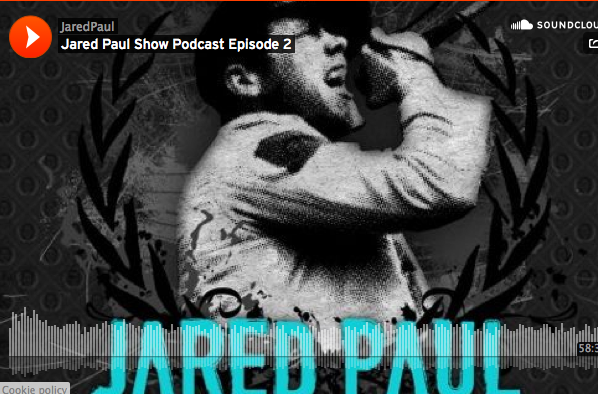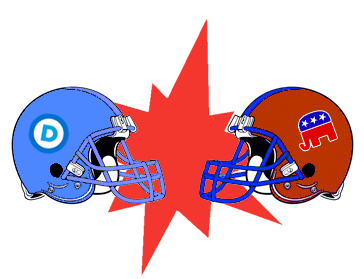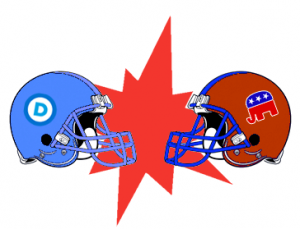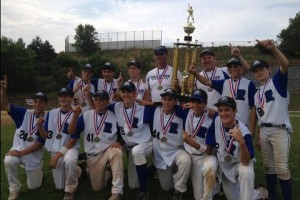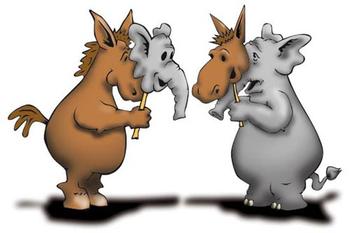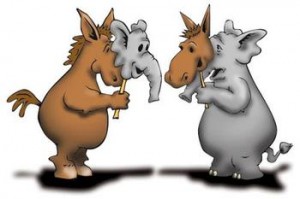 Imagine turning on your car radio and hearing of the baseball trade of the century. The New York Yankees and the Boston Red Sox had just traded their entire rosters to each other. That’s right, Jeter and Rivera are now Red Sox and Pedroia and Lester will suit-up for the Bronx Bombers. How do you feel most fans would react? Do you think most loyal Sox rooters would switch over to the Yankees? Do you think most Yankee fans would now adopt Jacoby Ellsbury as their own?
Imagine turning on your car radio and hearing of the baseball trade of the century. The New York Yankees and the Boston Red Sox had just traded their entire rosters to each other. That’s right, Jeter and Rivera are now Red Sox and Pedroia and Lester will suit-up for the Bronx Bombers. How do you feel most fans would react? Do you think most loyal Sox rooters would switch over to the Yankees? Do you think most Yankee fans would now adopt Jacoby Ellsbury as their own?
It’s my belief that once all is said and done a significant number of fans cheer for laundry. Very few players come from the places they play for. In fact, in baseball, basketball and hockey many don’t come from the United States. Fans root for players despite steroid scandals (Barry Bonds) episodes of cheating (Bill Belichick, Paul Hornung) and drug use (Lawrence Taylor). In some cases fans will even ignore major legal woes (L.T. again, Ben Roethlisberger, etc.). The only time fans will turn against athletes is if they jump teams (LeBron James), verbally insult the town, or stop trying (quit on the team). Other than that – fans live vicariously through players for reasons that defy logic.
In many ways party politics is much the same as sports when it comes to who to support and vote for. Sure, many folks will vote for the best individual or the best political position/solution just as a number of fans enjoy the game and root for individual players or a certain team’s approach towards competing. However, a significant portion of fans choose the local team to cheer for due to zip code and again, laundry. Voters are often the same. We all know people who claim to be either Republicans or Democrats. We all know people who say the Republicans are all this and the Democrats all that. Along with this train of thought comes one party is the good one while the other is responsible for all the ills of the world.
Stereotypically, Democrats are presently seen as the party of big government, entitlement and passivity. They are also the party of choice for overwhelming numbers of Black and Hispanic voters. All of this hasn’t always been so. In fact, history tells us that Democrats were often the ones who fought against many of the measures designed to support minorities. Folks like George Wallace (Alabama) and Lester Maddox (Georgia) battled hard to maintain much of the segregation of the Deep South. Amazingly, it was Lyndon Johnson ( a Texas Democrat) who broke ranks in 1964 by signing the Civil Rights Bill. A total of 18 Southern Democrats attempted filibustering the bill–eventually to no avail.
Going way back, Democrats in the 1880’s took a strong stance against the labor movement. Doesn’t sound like today’s Democratic Party does it? On top of all of this it’s amusing to hear how Democrats are viewed as passive when Harry S. Truman OK’d the dropping of two nuclear bombs and his predecessor Franklin Roosevelt was heavily involved with most decisions involving World War II. Oh yeah–don’t forget JFK’s involvement with the Bay of Pigs and the Cuban Missile Crisis. Sometimes it’s just easier to go with the stereotypes I guess.
As for the Republicans, they are often viewed as being for big business, a large and active military, opposed to social programs and heavy on the caucasian side. Again, history often depicts a different picture. Lincoln worked to abolish slavery and all that ensued.
Teddy Roosevelt (interestingly) won the Nobel Peace Prize for his involvement bringing the Russo-Japanese war to an end and also was famous for being a ‘trust-buster’ seeking to curb the power of large corporations. Fascinating, considering this came from a guy who once said “Speak softly and carry a big stick.” Who would have thought he’d use that stick against rich folk on occasion? It should also be noted that Teddy was a big advocate for the environment. Imagine ‘Mr. Bully Pulpit’ being a ‘Tree Hugger’. Finally, let’s not forget, while Clinton pointed to the military industrial complex it was actually Dwight Eisenhower who coined the phrase. We should also keep in mind that Truman nearly begged Eisenhower to run as a Democrat in the 1952 election.
Democrats acting like Republicans–Republicans acting like Democrats–sounds as though the Yankees and the Red Sox just made that big trade I offered in the first paragraph. Still, folks cheer for their home team. Still, loyal Republicans and Democrats root for Elephants and Donkeys despite what history reports.
Why people vote the way they do is probably a lot like why sports fans cheer for who they do. As I stated previously, certainly some who follow athletics dig deeply into history and develop an understanding, a sense of which player is effective and to some extent how and why. The same can be said for many voters–there are those who understand trends, values and the major issues. In spite of this there are individuals who simply vote and cheer by emotion, perpetual motion or a small knowledge base. Sometimes we confuse this for loyalty.
For certain, loyalty can be a good quality in most instances. However, blind loyalty often leads to jingoism, fanaticism and other such stuff. We’ve seen Chicago Cubs fans castigate Steve Bartman for his interfering with a foul ball which many feel led to another demise by the Cubs. We’ve seen Boston fans scream and shout at Bill Buckner for letting Mookie Wilson’s slow roller go through his legs. In basketball, Wilt Chamberlain was often called a choker by fans and on the gridiron, quarterbacks on winning teams, especially Super Bowl winners, are seen as better than those who lose (despite circumstances). Stuff like this doesn’t always make sense–but neither does taking off your shirt, painting yourself a certain color and then sitting around watching a game in below freezing weather.
Politics brings out some of the same behavior we see in sports. Have you ever seen a political rally or convention? Oh those hats! Oh those buttons and placards! OH that B.S. It’s really not all that much different from a sporting event. Some people buy this stuff. Why? Perhaps they feel a sense of belonging. Perhaps they also feel a sense of power. My party winning the presidency is a lot like your team winning the Super Bowl. Obviously, the political ramifications influence things like foreign policy, the pocketbook, rights and privileges, etc.– but the process of who we root for is close to the same.
Politics and sports both have their rivalries and deep sense of loyalty. When Babe Ruth was traded to the Yankees from Boston it sparked an intense and bitter war, which for the Bostonians didn’t play out well. The Curse of the Bambino resulted in the Sox not winning a title for 86 years. The Ruth trade initiated one of sports greatest rivalries which is as intense today as ever. The ‘Babe’ became a NY idol and a Boston object of scorn. Politics too has its rivalries. Jefferson vs. Adams, Lincoln vs. Douglas and Nixon vs. Kennedy are but a few of the most famous. While Ruth went to NY via a trade, no sin in politics is worse than being labeled a flip-flopper. Never mind additional information. Forget seeing an issue in a different light. If you get labeled a flip-flopper you are in trouble (especially if you flip on your own party). Kind of goes back to that rooting for laundry thing or ‘Don’t baffle me with facts, my mind is already made up’. Sports stars changing teams is one thing, but politicians make really important decisions. Being loyal is seen as more important than doing the right thing.
It should be noted that Strom Thurmond once did the big switcheroo from Democrat to Republican over civil rights and segregation issues. In fact, a number of Democrats jumped ship after Lyndon Johnson pushed his civil rights measures in 1964 (which were started by a Massachusetts Democrat John Fitzgerald Kennedy). Many southern Democrats decided to back Barry Goldwater, a conservative Republican during the ’64 election over Johnson. While Thurmond continued to be elected by his home state history has offered a conflicting view of his past. Some good. Some bad. Being a segregationist will be something he’ll always be known for. In this case maybe politicians can be traded. Over time, the Democrats and the Republicans have switched stations on many issues. Entire Political parties have flip-flopped. In fact, it is often par for the course. The problem is many voters don’t take the time to look into this.
On a local level, former Governor and Senator John Chafee was often considered a bit too moderate by his own Republican Party. Remember, Chafee played a key role in voting against removing President Clinton from office over the Lewinsky affair. Today, his son often gets heat for being too timid or a flip-flopper (it actually cost him an election). I could go on and on regarding loyalty and flip-flopping, but won’t. It seems that being intransient is valued commodity in party politics. However, in practice flip-flopping is a given.
It appears as though keeping your original stance and/or being in line with one’s party takes precedence over thought-based change. Is winning so important? I understand the whole getting elected thing but Niccolo Machiavelli would love this stuff. It’s been said that one key aspect of intelligence is being able to juggle two opposing dynamics and somehow come up with a conclusion that makes sense (a bit of paraphrase). Do we want politics to make sense–or do we want it to reflect our emotions and belief sets? The Philosopher, Arthur Schopenhauer wrote “Everyone takes the limits of his own vision for the limits of the world.” Would we want our kids growing up to think this way?
So, what does all of this tell us? There is a lot of emotion in politics and sports. Both can bring out the best and worst of our species. Sometimes it’s about money. Sometimes it’s about image. Politics and sports while often run by people who desire power are at their core both beautiful. Sports can teach us things like teamwork, effort, respect and having some fun. Politics can teach us about caring and service to others. Who we cheer for does matter. It tells us a little about ourselves. Stephen Douglas (a rival of Lincoln’s who gave us the Kansas-Nebraska Act and a Democrat) once was kind enough to hold Abe’s hat at his swearing in. Later, Douglas would say that “if I can’t be the President I might as well hold his hat.” Douglas said that with humor but also offered up a sense of civility despite his defeat. Ah–civility, now that’s an interesting concept. It’s certainly something that our society needs a bit more of these days.
In the end, root for your team and vote for the candidate you feel represents the country best. And while there might not be an ‘I’ in team there are two of them in politics. They should stand for imagination and integrity. Mark Twain once asserted “You can’t depend on your eyes when your imagination is out of focus.” A broader approach just might reveal new insights. Until next time.

